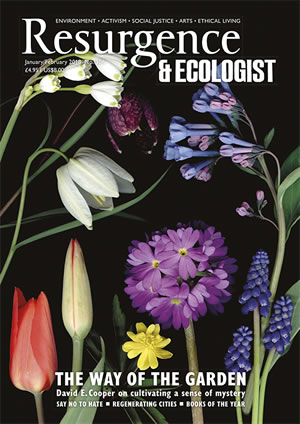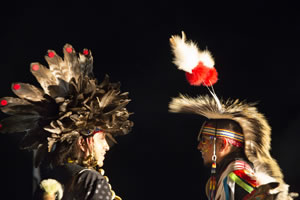Documentaries following activist campaigns have a tendency to result in somewhat single-layered films, whose main purpose is to drive home a simplified political message. But single-layered this film is not. AWAKE: A Dream from Standing Rock follows the fight by the Standing Rock Sioux tribe to stop the Dakota Access Pipeline going through their land and under the Missouri river. The film is split into three parts with a different director for each, allowing multiple angles on complex issues involving questions of nonviolent resistance, Indigenous identity and land rights.
The film opens with a montage of water and a soft female voice telling us she is having some kind of waking dream, where all living things became afraid and the water is at risk. After dramatic images of factories, smoke and pollution, we see the Standing Rock protest camp, and she makes the positions clear: “On one side: greed, fear, money, violence, hate and oil. On the other: generosity, faith, freedom, peace and water.” This becomes much more real when we are grounded on the frontline with two young protesters telling us, with huge grins and weeping eyes full of teargas, that the police are “humans, just like us”. This compassion towards the enforcers of the pipeline is what the film is built on, and nonviolent direct action is the tool they use in their battle. It is even more affecting that at this point the videographer is hit by a rubber bullet.
After the images of so much suffering, the second part becomes more observational, with less music and no voiceover, immersing the viewer in the life of the protest camp. I found it a pleasant relief from the narration and continual use of added music, which I felt was unnecessary in an already dramatic situation. We see prayers in front of police lines, army veterans mucking in, donated clothes being sorted, and a community that thrives in an almost utopian temporality brought on by the struggle. Even in the scenes of violence, such as a night protest where tear gas, rubber bullets and water cannon are deployed, we sense the peaceful defiance of the protesters to protect themselves but not lash out in retaliation. As well as many Indigenous people from other communities, we see a joining of many non-Indigenous activists. The documentary directly asks its audience at several points: “Will you wake up and dream with us?”
In December 2016 President Obama halted the pipeline temporarily and a victory was declared, but we are not at the end of the film. The third part centres on director Myron Dewey and his Digital Smoke Signals media organisation, giving a broader picture of the way social media is used as an Indigenous tool and an alternative to mainstream outlets. But whilst each part of the film does indeed add another angle, quite literally in the way it is filmed and edited, by part three the main weakness is revealed: none of these differing angles offers a more complex look at the issues of representation and self-representation within Indigenous communities. We hear the usual ‘us and them’ mainstream/activist media narrative, but the opportunity is missed to use the film itself as an example of the more nuanced issues surrounding this. It’s a shame a less mainstream film-making method wasn’t attempted, where music isn’t used to heighten drama, and a voiceover isn’t needed.
The coda, directed by all three film-makers, deals with the election of Donald Trump as US president and his subsequent signing of an executive order to restart the pipeline. Many disturbing things occur, the most striking of which is when the protest camp is torn to shreds by armed soldiers pointing guns in people’s faces. An earlier statement by Dewey, that “climate change isn’t only about the Earth, but about how we treat each other,” becomes increasingly pertinent. This leads into the final question: “Will you join us?”
I was surprised to read that the film is available on the commercial platform Netflix and wasn’t distributed solely through activist networks, but maybe its final question should be asked to a more general audience who happen upon it by chance. The point is, after all, that we are all one humanity and should stand up for each other, no matter where we’re sitting.








